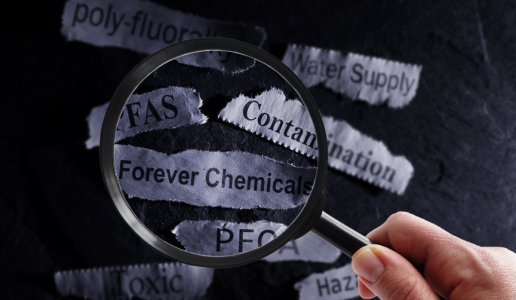Alert: The Toxic Truth Unveiled by a Health Journalist – How to Avoid Cancer-Causing Chemicals in Everyday Life!
By
Gian T
- Replies 0
In the quest for longevity and health, especially as we age, it's crucial to be aware of the hidden dangers lurking in our everyday environment. One such peril is the presence of toxic chemicals, such as PFAS (per- and poly-fluoroalkyl substances) and microplastics, which have been linked to a host of health issues, including cancer, infertility, and hormone disruption. As members of the Seniors Discount Club, it's important to stay informed and take proactive steps to minimise our exposure to these harmful substances.
PFAS, commonly known as 'forever chemicals', are a group of man-made chemicals found in a wide range of consumer products, including non-stick cookware, waterproof clothing, and food packaging. Their ability to resist heat, water, and oil has made them popular in manufacturing, but their persistence in the environment and our bodies raises significant health concerns. Studies have shown that these chemicals can accumulate in the body over time and are difficult, if not impossible, to break down, hence the moniker 'forever chemicals'.
A health journalist with a decade of experience covering health issues and a personal family history of cancer took it upon herself to make significant lifestyle changes to reduce her exposure to these chemicals. Her journey provides valuable insights and practical tips that we can all learn from.
Firstly, she focused on her diet. The journalist consciously tried to avoid ultra-processed foods, which are more likely to contain PFAS due to their extensive processing and packaging. Instead, she opted for whole foods with minimal ingredients, such as organic chicken, plain rolled oats, and fresh fruits and vegetables. By doing so, she not only reduced her chemical intake but also embraced a healthier eating pattern.
When it comes to cookware, she ditched her old non-stick pans, which likely contained PFAS, in favour of stainless steel options. While stainless steel cookware can be more challenging to use and clean, it's a safer choice for those looking to avoid toxic chemicals. Similarly, she replaced plastic food containers with glass alternatives, which are non-toxic and won't leach chemicals into food.
Beyond the kitchen, the journalist examined her personal care routine. She swapped out her traditional shampoo for a shampoo bar free of harmful chemicals and plastics, and she's in the process of going fragrance-free, as many scented products contain phthalates, another group of chemicals with health risks.
Even her bathroom routine transformed. After learning that popular toilet paper brands could contain PFAS, she and her husband invested in a bidet, reducing their exposure to these chemicals and cutting down on household waste and expenses.
While these changes may seem daunting, the journalist emphasises the importance of taking small, manageable steps towards a healthier lifestyle. It's not about perfection but progress. An 80:20 approach to diet, where 80 per cent is healthy and 20 per cent allows for indulgence, can make the transition more sustainable.
It's especially important for our senior community to be vigilant about these exposures. As we age, our bodies may become more susceptible to the effects of toxic chemicals. Therefore, making informed choices about the products we use and the food we eat can significantly impact our health and well-being.
Members, have you made any changes to reduce your exposure to toxic chemicals? What challenges have you faced, and what benefits have you noticed? Share your experiences in the comments below, and let's support each other in making healthier choices for our future.
 Remember, knowledge is power, and by staying informed and making conscious decisions, we can protect ourselves and our loved ones from the hidden dangers of toxic chemicals. Let's take control of our health and lead by example for future generations.
Remember, knowledge is power, and by staying informed and making conscious decisions, we can protect ourselves and our loved ones from the hidden dangers of toxic chemicals. Let's take control of our health and lead by example for future generations.
PFAS, commonly known as 'forever chemicals', are a group of man-made chemicals found in a wide range of consumer products, including non-stick cookware, waterproof clothing, and food packaging. Their ability to resist heat, water, and oil has made them popular in manufacturing, but their persistence in the environment and our bodies raises significant health concerns. Studies have shown that these chemicals can accumulate in the body over time and are difficult, if not impossible, to break down, hence the moniker 'forever chemicals'.
A health journalist with a decade of experience covering health issues and a personal family history of cancer took it upon herself to make significant lifestyle changes to reduce her exposure to these chemicals. Her journey provides valuable insights and practical tips that we can all learn from.
Firstly, she focused on her diet. The journalist consciously tried to avoid ultra-processed foods, which are more likely to contain PFAS due to their extensive processing and packaging. Instead, she opted for whole foods with minimal ingredients, such as organic chicken, plain rolled oats, and fresh fruits and vegetables. By doing so, she not only reduced her chemical intake but also embraced a healthier eating pattern.
When it comes to cookware, she ditched her old non-stick pans, which likely contained PFAS, in favour of stainless steel options. While stainless steel cookware can be more challenging to use and clean, it's a safer choice for those looking to avoid toxic chemicals. Similarly, she replaced plastic food containers with glass alternatives, which are non-toxic and won't leach chemicals into food.
Beyond the kitchen, the journalist examined her personal care routine. She swapped out her traditional shampoo for a shampoo bar free of harmful chemicals and plastics, and she's in the process of going fragrance-free, as many scented products contain phthalates, another group of chemicals with health risks.
Even her bathroom routine transformed. After learning that popular toilet paper brands could contain PFAS, she and her husband invested in a bidet, reducing their exposure to these chemicals and cutting down on household waste and expenses.
While these changes may seem daunting, the journalist emphasises the importance of taking small, manageable steps towards a healthier lifestyle. It's not about perfection but progress. An 80:20 approach to diet, where 80 per cent is healthy and 20 per cent allows for indulgence, can make the transition more sustainable.
It's especially important for our senior community to be vigilant about these exposures. As we age, our bodies may become more susceptible to the effects of toxic chemicals. Therefore, making informed choices about the products we use and the food we eat can significantly impact our health and well-being.
Members, have you made any changes to reduce your exposure to toxic chemicals? What challenges have you faced, and what benefits have you noticed? Share your experiences in the comments below, and let's support each other in making healthier choices for our future.
Key Takeaways
- A health journalist has shared her efforts to reduce exposure to PFAS, toxic chemicals linked to various health risks, by changing her lifestyle and consumer choices.
- She has altered her diet to minimise processed foods and opts for organic, less processed options, avoiding food packaging likely to contain PFAS.
- The journalist has replaced non-stick cookware and plastic containers with stainless steel and glass alternatives to decrease the chance of chemical leaching.
- Personal changes also extend to using a bidet instead of traditional toilet paper and selecting beauty and hygiene products free from harmful chemicals like phthalates and fragrances.








